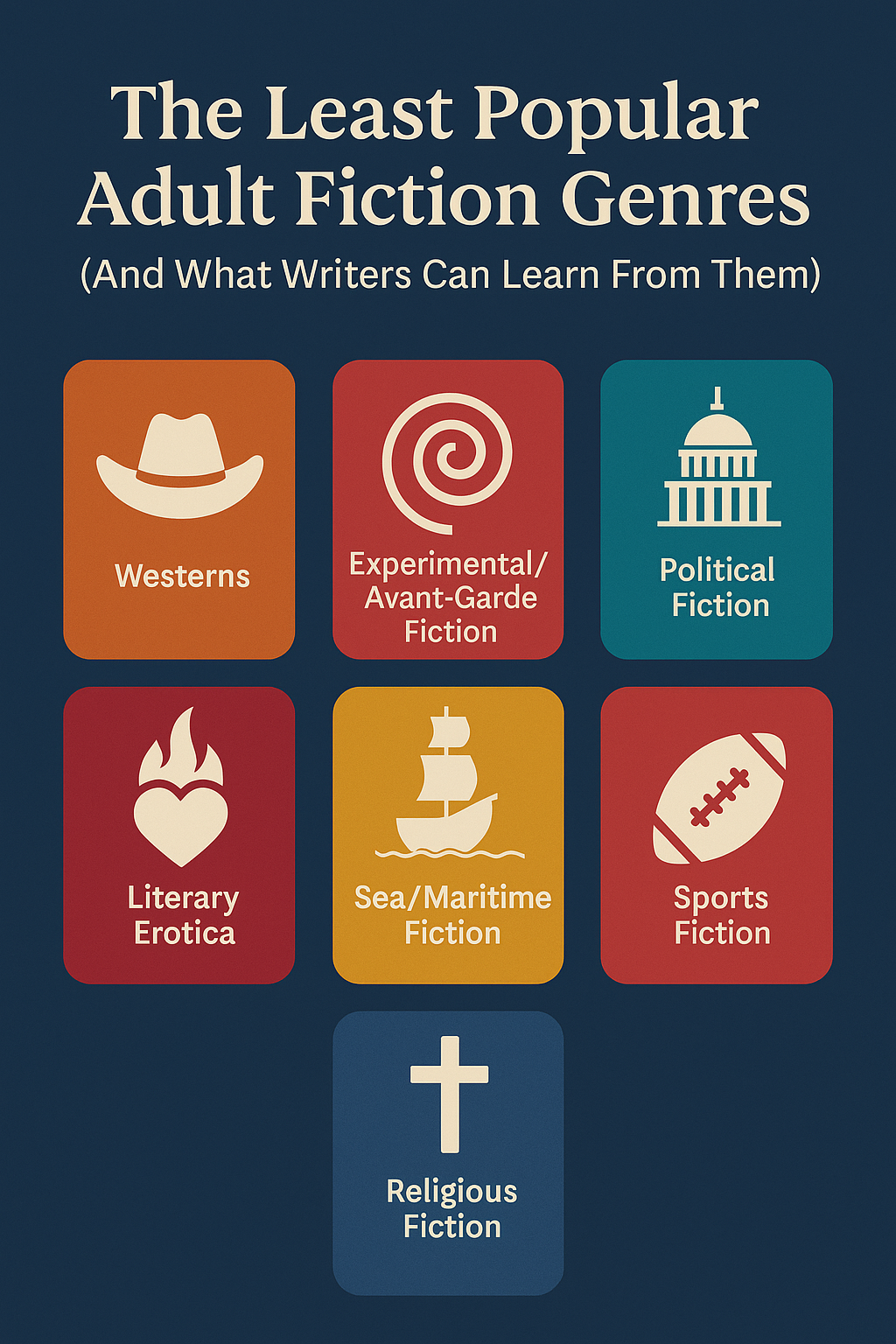When you're starting out as a fiction writer, one of the biggest questions you’ll face is which genre to write in. Some genres—like romance, thrillers, or fantasy—have enormous fan bases and commercial momentum. Others are quieter corners of the literary world: genres with smaller audiences, limited demand, or declining popularity.
But make no mistake: less popular doesn’t mean not worth writing. Many authors find purpose, passion, and even success in writing for a niche market. Still, it helps to understand the current literary landscape so you can set realistic expectations, make strategic choices, and think creatively about how to position your work.
Here are seven of the least popular adult fiction genres today, and what you can take away from them as a new writer.
🏜️ 1. Westerns
Once iconic, now niche.
Westerns were once a dominant genre, romanticizing the American frontier with tales of cowboys, outlaws, and rugged justice. But today, traditional Westerns have largely faded from mainstream publishing.
Why they struggle: Modern readers often find the themes outdated or repetitive. The genre’s historical focus and lack of diversity have also limited its reach.
Opportunity: Westerns that break the mold—such as feminist, Indigenous, or speculative takes—are carving out space in indie publishing and film.
🌀 2. Experimental or Avant-Garde Fiction
Artful, daring—and very niche.
These books bend or break the rules of narrative structure, style, and even language. They’re often more focused on concept than plot.
Why they struggle: The average reader often craves clear stories, not abstract puzzles. These works tend to be more appreciated in academic or literary circles than by general audiences.
Opportunity: Festivals, literary magazines, and small presses are more open to innovation—especially if your work has a bold voice or theme.
🏛️ 3. Political Fiction
Sharp commentary, but not always accessible.
Books that center on political ideologies, government systems, or activism can offer insight and spark dialogue—but they risk alienating readers.
Why they struggle: Political fiction can feel preachy or polarizing if not handled with nuance. It also tends to age quickly when tied to current events.
Opportunity: Dystopian fiction and political satire—especially when grounded in character-driven storytelling—can thrive if they speak to broader human truths.
🔥 4. Literary Erotica (Without Romance)
Sensual, but not sentimental.
Erotic fiction focused more on sensuality than romance exists, but it’s a narrow market in adult fiction.
Why they struggle: Many readers prefer romance that includes erotic elements, rather than stories solely about sex or desire. Standalone erotica without emotional stakes can feel shallow to some audiences.
Opportunity: Literary erotica that explores desire, identity, or emotional complexity (e.g., Anaïs Nin) can appeal to readers looking for sophistication and depth.
⚓ 5. Sea/Maritime Fiction
Adventurous, but anchored in the past.
Stories set at sea or centered around naval life (like classic ship voyages) appeal to a small, dedicated audience.
Why they struggle: The genre feels dated to many readers. It’s often tied to historical contexts or technical jargon that alienate casual fiction fans.
Opportunity: Sea fiction that blends genres—like historical fantasy, horror-at-sea, or survival thrillers—can reach broader audiences.
🙏 6. Religious Fiction (Non-Inspirational)
Spiritual depth, but limited appeal.
While inspirational or faith-based fiction has an established market, religious fiction that explores theology or sacred themes outside those bounds is tougher to sell.
Why they struggle: These books may not appeal to mainstream readers and may be too nuanced or critical for devout audiences.
Opportunity: Symbolic stories, allegories, and spiritual journeys that focus on universal themes (like The Alchemist or The Book Thief) can resonate widely.
🏈 7. Sports Fiction (for Adults)
High stakes on the field, low traction in bookstores.
Adult fiction centered on athletes or sports often underperforms, unless blended with other strong emotional or cultural themes.
Why they struggle: Many sports fans prefer nonfiction or memoirs. And non-sports readers may skip books that seem technical or narrowly focused.
Opportunity: Stories that use sports as a backdrop for emotional arcs (e.g., grief, coming-of-age, community identity) can appeal beyond fans of the sport itself.
🧭 So… Should You Avoid These Genres?
Not necessarily.
In fact, niche genres can be incredibly rewarding to write—especially for authors with a deep passion for their subject or a unique perspective to offer. The key is to:
- Understand your audience (even if it's small)
- Blend genres creatively (e.g., a political romance, or a suspenseful maritime thriller)
- Leverage indie and digital publishing for control and reach
- Focus on voice and authenticity—that’s what makes any story stand out
And remember: trends evolve. What’s niche today might surge tomorrow with the right story, the right platform, or the right cultural moment.
✍️ Final Thought: Write What Sparks You
Choosing your genre isn’t just a business decision—it’s a creative one. Don’t shy away from a genre you love just because it’s not trending. But do go in with eyes wide open. Pair your passion with strategy, and you’ll be able to write boldly and smartly—wherever your voice leads you.







